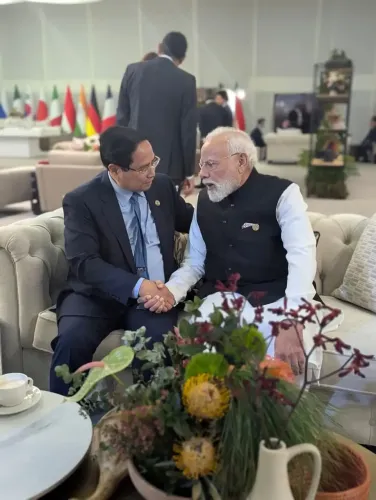Is the US Engaging in Counterterrorism Talks with Pakistan?

Synopsis
Key Takeaways
- US and Pakistan reaffirm commitment to combat terrorism.
- Dialogue emphasizes the need for sustained collaboration.
- Three terrorist groups specifically identified.
- Condolences expressed for recent terrorist attacks in Pakistan.
- Focus on developing capabilities to address security challenges.
New York, Aug 13 (NationPress) The United States has initiated a counterterrorism dialogue with Pakistan, a nation known to host various terrorist entities and groups. In their joint statement, both parties reiterated their shared commitment to address terrorism in all its forms.
During the discussions held in Islamabad on Tuesday, the US expressed appreciation for Pakistan's ongoing efforts to manage terrorist organizations that threaten both regional and global peace and security.
The statement identified three terrorist groups: the Balochistan Liberation Army (BLA), ISIS-Khorasan, and Tehreek-e-Taliban Pakistan (TTP). However, it did not mention at least five other groups and their affiliates that are included in the US government's list of terrorist organizations operating from Pakistan.
Notably, Osama bin Laden, the notorious leader of al-Qaeda responsible for the 9/11 attacks, found refuge in Pakistan before being eliminated by US Navy Seals in a 2011 operation.
The dialogue was co-chaired by Gregory LoGerfo, the US State Department’s Coordinator for Counterterrorism, and Nabeel Munir, Pakistan’s special secretary for the United Nations.
According to US State Department Spokesperson Tammy Bruce, the discussions focused on enhancing collaboration to combat terrorist threats, which is beneficial for both the region and the world.
The joint statement emphasized that sustained and structured engagement is crucial for countering terrorism and promoting stability.
This dialogue is not a direct result of recent friendly relations between US President Donald Trump and Pakistan’s military leadership; it has been an annual event since at least 2023, during Democrat Joe Biden’s presidency.
Both delegations highlighted the importance of developing effective strategies to address the threats posed by the mentioned terrorist groups.
On the eve of this dialogue, the US added the BLA and its affiliate, the Mujaheed Brigade (TMB), to its Foreign Terrorist Organizations list, subjecting them and their leaders to US sanctions.
The US also conveyed condolences for the loss of life among civilians and law enforcement personnel due to terrorist acts in Pakistan, including the brutal Jaffar Express terrorist attack and the bombing of a school bus in Khuzdar.
The BLA claimed responsibility for the Jafar Express train hijacking in April, which resulted in the deaths of 31 civilians and security personnel among more than 300 passengers.
The Pakistani government attributed the suicide bombing of a school bus in Khuzdar in May to the BLA, which resulted in the deaths of at least ten civilians, including eight students.
The statement indicated that the US and Pakistan are committed to strengthening institutional frameworks and enhancing capabilities to tackle security challenges and counter the utilization of emerging technologies for terrorist activities. They also aim to collaborate within international organizations like the UN, where Pakistan is currently serving as an elected member of the Security Council.
Interestingly, the joint statement did not address several organizations on the US government's Foreign Terrorist Organization list, including Hizbul Mujahideen, Jaysh al-Adl/Jundallah, Lashkar i Jhangvi, Jaish-e-Mohammed, Harakat ul-Mujahidin, and Lashkar-e-Tayyiba, alongside four affiliates, including The Resistance Front, which was added to the list last month after carrying out the Pahalgam massacre in April.









